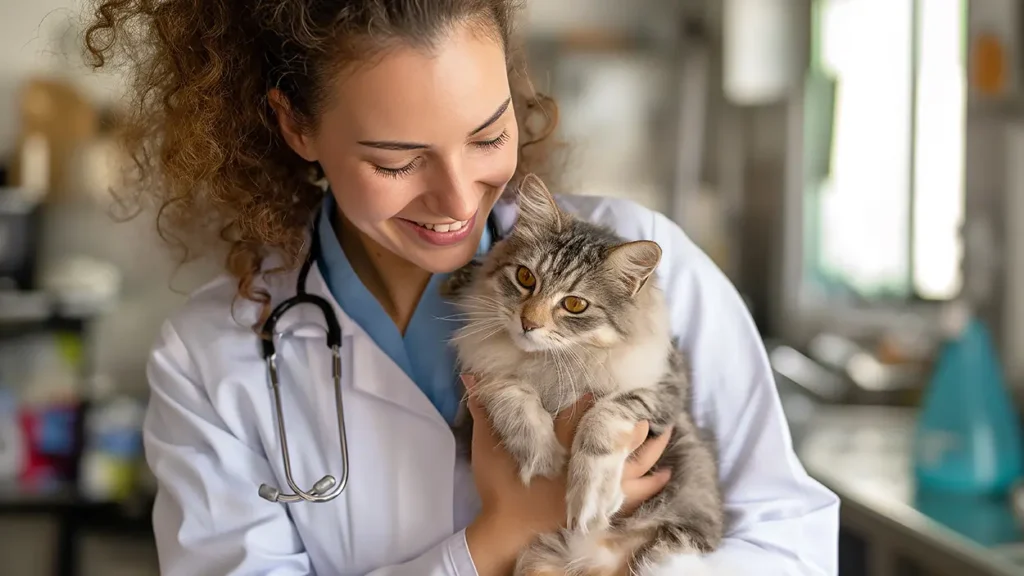DEAR TABBY | Scents and Sensibility: Helping a Basset Adapt to Vision Loss

Dear Tabby,
I’m writing with a heavy heart about my beloved basset hound, Cooper. He’s been my loyal, low-riding companion for 12 wonderful years, but recently, he’s been diagnosed with progressive vision loss due to glaucoma, a condition unfortunately common in his breed.
Seeing my once keen-nosed, clear-eyed boy struggling to navigate our home breaks my heart. He bumps into furniture with his long body, gets startled easily, and seems hesitant to follow scent trails on our usual walks. The vet says that while there are treatment options, given Cooper’s age and the condition’s progressive nature, we’re looking at managing his comfort rather than reversing the vision loss.
I’m at a loss, Tabby. How can I help Cooper adjust to this new reality? Are there ways to make our home more comfortable for a dog with such a unique body shape who’s losing his sight? How do I keep him safe yet still allow him to enjoy life and use his powerful nose? And, if I’m being honest, I’m struggling to adjust too. It’s hard to see my best friend, with his long ears and those soulful but now failing eyes, go through this.
Any advice you can offer would be deeply appreciated. Cooper has given me so many years of joy, companionship, and amusing howls, and I want to do everything I can to make his golden years as comfortable and happy as possible.
Sincerely,
Hounded by Worry in Wilmington
Dear Hounded by Worry,
Your letter about Cooper struck a chord that resonates as deeply as a basset’s mournful howl. I can almost picture those long, velvety ears and soulful eyes that have captured your heart for 12 years. Vision loss in our beloved companions is a challenging journey, but remember, Cooper’s world is still rich with the scents he can track, the sounds he can pinpoint, and the comforting touch of your hand on his fur.
First and foremost, let me applaud you for seeking professional veterinary care. Always continue to work closely with Cooper’s vet, as they can provide tailored medical advice and monitor his condition.
Now, let’s sniff out some strategies to help Cooper navigate his new, dimmer world while still living life to the fullest. While his eyes may be failing him, his legendary basset nose, sensitive ears, and the feeling of your loving touch will be more important to him than ever.
- Scent-sational Navigation: Use Cooper’s powerful nose to his advantage. Place different scented items (like lavender, vanilla, or citrus) at key points around your home. This will help him create a ‘scent map’ to navigate. Just be sure to keep these scents consistent and out of his reach.
- Sound Cues: Bassets are known for their excellent hearing too. Try wearing a small bell on your ankle when you’re home, so Cooper can easily locate you. You can also use different sound cues for different activities, like a specific whistle for mealtime.
- Tactile Trails: Create ‘trails’ with different textures on the floor. A strip of carpet on hardwood can guide Cooper to his food bowl or bed. This works well for a low-rider like him who’s already close to the ground.
- Clearing the Runway: Given Cooper’s long body, it’s extra important to clear paths through your home. Remove unnecessary obstacles and try to keep furniture in consistent places.
- Elevate the Food: Raised food and water bowls can make mealtimes easier for Cooper, reducing strain on his neck and making the bowls easier to find.
- Safe Outdoor Adventures: For walks, stick to familiar routes and use a harness instead of a collar for better control and comfort. Let Cooper stop and sniff to his heart’s content – this is his way of ‘seeing’ the world now. Living in Wilmington, you’re blessed with the Riverwalk and boardwalks that can be excellent for Cooper. These areas typically have consistent surfaces and plenty of interesting scents from the Cape Fear River and nearby restaurants, which can provide stimulating yet safe environments for your low-riding explorer.
- Beach Therapy: While you might need to avoid the strong surf at Wrightsville Beach, consider gentle walks along the quieter parts of Carolina Beach. The sound of waves, the texture of sand under his paws, and the rich tapestry of beach scents can provide Cooper with a wonderfully stimulating experience that doesn’t rely on vision. Just be sure to go during quieter times and keep him on a leash for safety.
Remember, Cooper may get frustrated or scared at times. Patience and reassurance are key. Speak to him often in a calm, cheerful voice to help him locate you and feel secure. The gentle lapping of the Cape Fear River or the distant sound of boat horns might even become comforting background noise for him at home if you live near the water.
As for your adjustment, it’s natural to feel saddened by these changes. Cooper has been your clear-eyed companion for so long. But take heart in knowing that dogs, especially scent-driven breeds like bassets, adapt remarkably well to vision loss. Your love and care are the most important factors in Cooper’s happiness.
Consider joining a support group for owners of visually impaired pets. Sharing experiences and tips with others in similar situations can be incredibly helpful.
Lastly, celebrate the good days, the happy howls, and the nose-to-the-ground determination that makes Cooper uniquely Cooper.
With your love and these adjustments, I’m positive Cooper’s tail will keep wagging for many years.
Remember, while it’s crucial to keep up with vet check-ups and follow professional medical advice, your dedication to Cooper’s well-being is the guiding light he needs in his darkening world.
Wishing you and Cooper all the best,
Tabby
P.S. If Cooper could talk, I’m sure he’d tell you that as long as he has his nose and you at his side, his world is still full of wonder and joy!
Purr-plexed?
Have a pet predicament?
Need a helping Paw?
Write to Dear Tabby at:
deartabby@pawzhub.com
or
P.O. Box 4995
Westlake Village, CA 91359




Responses